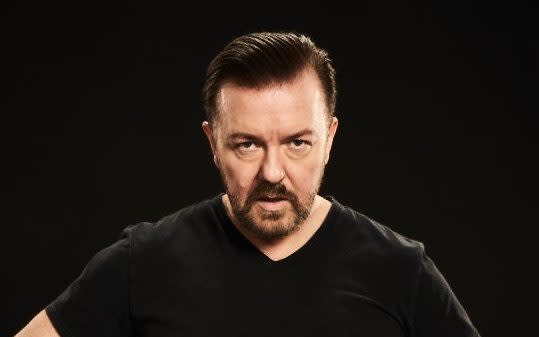Ricky Gervais’s Armageddon is a tiresome cocktail of neediness and tastelessness

NB. This is a review of the Manchester leg of Ricky Gervais’s Armageddon tour, from December 2022
Ricky Gervais has an air of neediness: you sense he wants, desperately, to be liked. In the right role it’s a brilliant asset; it gave a tragic edge to David Brent’s wheedling in The Office, and Andy’s social-climbing in Extras. But Gervais is in the wrong role in his polished but hollow stand-up, miscasting himself as a bad-taste provocateur.
When his last stand-up set, Supernature, landed on Netflix in May 2022, there was “a big backlash, which made it the most-watched special of the year”, he points out in this follow-up hour. Offence sells, so this tour, which he half-jokes is a dress rehearsal for the next lucrative Netflix special, offers more of the same, albeit with less about trans people (the main source of the backlash), and more about disabled people and paedophiles.
Not that he has anything especially interesting to say about either; “cripple” and “nonce” are just easy shortcuts to a dark laugh. Like mentioning rape, dead babies or Aids – or raped babies, or dead babies with Aids. Gervais’s imagination circles around a very small pool of tropes. As in previous shows, he imagines how God designed genitals, mocks prayer’s medical inefficacy, mimes masturbating and namedrops Hitler, with little flair for phrasing, and largely unvaried delivery.
But, really, he wants to be an ideas man; he’s a frustrated lecturer, with his onstage lectern and statistics about human evolution. He gestures towards intriguing theories on social hypocrisy, irony, freedom of speech, but they never take off – it’s the crassest lines that get the biggest laughs. What could become interesting points are hobbled by the hour’s contradictions. “If you’re relying on the audience to agree with you to get applause, you’re losing something comedically,” he says, in a show that contrives several applause-breaks for approval.
He complains about “virtue-signalling”, yet moralises about the environmental case for eating less meat, humble-brags about video-calls he’s done for terminally ill children, and reminds us his ticket-sales support animal charities. The largely laughless encore offers a thin, sentimental defence of comedy as free speech: “There’s nothing wrong with laughter, it is great, it makes everyone feel better!” You’d never hear that kind of special-pleading from, say, Doug Stanhope.
Gervais is competent enough – I chuckled once or twice – but there’s nothing to surprise anyone here. If you want bad-taste one-liners, Jerry Sadowitz beats him on quality and Jimmy Carr on quantity. If you want philosophical, provocative comedy that mocks social pieties and says the supposedly unsayable, try Garrett Millerick, Alfie Brown, or Fin Taylor. Gervais is trapped between two ill-fitting styles, and outclassed in both directions.
Ricky Gervais: Armageddon is on Netflix now

